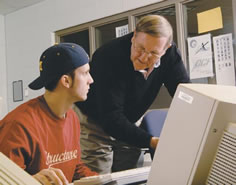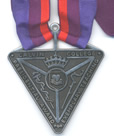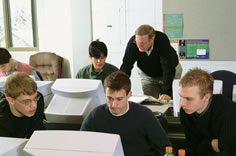Larry Nyhoff receives Calvin Exemplary Teaching Award
By Phil deHaan '84

Larry Nyhoff is recognized as an expert teacher.
Long before What Would Jesus Do (WWJD), Calvin computer science professor Larry Nyhoff had Let Christ Shine Through (LCST). And while he never turned the acronym into a wristband it became something perhaps even better: the anchor for his 10 commandments of teaching, commandments that have kept him true to what he considers one of life's noblest callings.
Over the last 20 years or so of his almost 40-year career the commandments have developed and been refined. Nyhoff now keeps them in his briefcase, has a copy of them on his PalmPilot and carries them in his mind and his heart where they daily inform his teaching.
During even a casual conversation about the art of teaching he refers to the commandments, by number, with startling regularity. Ask him, for example, about having fun as a teacher and he answers almost before the question is complete.
"Of course," he says, "it has to be fun. That's (commandment) number six: 'Don't take yourself too seriously.' It's very important to have a sense of humor as a teacher."

The one-of-a-kind medallion presented to Larry Nyhoff
Perhaps that's why Nyhoff thought Calvin president Gaylen Byker was kidding recently when he called to tell Nyhoff that he is the 2002 winner of Calvin's Presidential Award for Exemplary Teaching, Calvin's highest faculty honor. The award includes a one-of-a-kind medallion and provides the winner with a significant financial stipend thanks to the George B. and Margaret K. Tinholt Endowment fund, set up at Calvin by an anonymous donor in honor of George Tinholt, a former member of the Calvin Board of Trustees.
Says Nyhoff: "He told me 'Congratulations, you're the winner' and I think I said something brilliant like 'You've got to be kidding me.' I was simply dumbfounded."
Or perhaps Nyhoff was simply following commandment number five: DFI (all of the commandments have an acronym) for Don't Fake It. It's one of his key commandments and reflects, he says, an important lesson he's learned over the almost 40 years he's worked as a Calvin professor.
"Early in my career," he says, "I had a hard time saying 'I don't know.' I thought I couldn't do that as a professor. Now I think it's okay for students to see that you don't have all the answers. They don't think less of you. They might actually think more of you. So if I get asked about something I don't know I just say that. And then I check it out and come back the next day with the answer."
That willingness to learn with his students was a key factor in Nyhoff's career at Calvin and a significant shift he made about halfway into his tenure.
After graduating from Calvin in 1960 with a degree in mathematics, Nyhoff went on to earn a master's in the subject from Michigan in 1961 and then returned to Calvin to teach in 1963. He earned his Ph.D. from Michigan State in 1969 and then settled in for what he figured would be a rewarding teaching career as a mathematics professor.
But something unexpected occurred. Computers started becoming more and more common. And students began clamoring for courses on computers. Despite having no background in the subject Nyhoff volunteered to help out and develop and teach a few courses, learning the subject matter, he says, sometimes literally a day or two before teaching it to the students. Soon he was taking more and more responsibility for the burgeoning program. And then he cemented the deal, doing graduate work in computer science at Western Michigan from 1981-1983, at a time when he was 20 years into his Calvin career and already had tenure as a mathematics professor.
"There are days," he says, "when I doubt the wisdom of my shift from mathematics to computer science. Contrary to popular opinion teaching does not get easier as one gets older, at least not in computer science where the rapid change in subject matter makes it impossible to reuse materials from one year to the next without lots of checking and revising."
Blame commandment number two: UY for Upgrade Yourself. Or perhaps number four: BF for Be Flexible. Or maybe blame genetics.
George Nyhoff, Larry's father, was a "a self-made man." Despite owning just an eighth-grade education, George, a Kansas farmer, made a mid-life career change, selling the farm and buying the hardware store in nearby Dispatch, Kansas. There he sold a variety of goods to the locals and provided a variety of services, including World Series updates on a scoreboard outside his store every fall thanks to a radio he had built himself.
Later he also set up a repair shop (in an old church) where he kept the local farmers' plows and tractors up to snuff. He built a bus so the local kids could get to school and then he became the busdriver, rarely allowing anything, including bad weather, to keep him from his appointed duties.
"We'll give it a try," was his standard line anytime the Nyhoff boys dared hope for a snowday. And when electricity made its way to the rural areas of Kansas he wired pretty much every house in the four counties around Dispatch, having taught himself that skill along the way.
Lifelong education was a central part of the Nyhoff household thanks to George and Sarah, Larry's mother, who not only helped out at the hardware store and the repair shop, but who taught grade school before giving that up to raise a family of five boys. In addition to her work as a mom she also minded the hardware store and repair shop, cleaned the church and much more, while also nightly helping Larry and his siblings with their schoolwork, an influence, says Larry, "on my becoming a teacher."
So, like his dad, Larry made a mid-career switch, transitioning from teaching mathematics, the subject he had studied for eight years of college and graduate school, to computer science, a field growing so rapidly even those who had been in it all their lives could barely keep up.
And like his parents before him Larry Nyhoff has made the most of his mid-stream adjustment. Winning the 2002 Award for Exemplary Teaching is just the latest acknowledgment of his considerable talents. For like his dad, Larry Nyhoff wasn't content with the computer science equivalent of a hardware store. Nope, he decided to not only teach, but also to write. And now he's the author or co-author of some 25 computer science textbooks, including several of the world's most-used texts on the programming language C++.
His publisher estimates that close to 1 million of these textbooks have been printed. They're used in colleges and universities around the U.S and indeed around the world, including such countries as England, Finland, Germany, Lebanon, India, Egypt and Australia.
In fact, Calvin colleague Keith VanderLinden, chair of the computer science department, stumbled upon one of Nyhoff's texts at the University of Sussex bookstore in southern England while in the midst of interviewing for a job at Calvin, something that, he says, "raised my view of the college considerably and helped lead me to Calvin."
It's just another example of the first commandment: GMW for Give them their Money's Worth. That commandment is key for Nyhoff both in his work as a textbook author and in his teaching.
"It's important," he says, "to say that the textbooks I've done have pretty much all come out of my work as a teacher. I teach this stuff first and then do the textbooks. In fact the textbooks that have been least successful are the ones that did not first get tested in the classroom. I think that's because I work pretty hard at teaching."
Indeed Nyhoff, even after almost 40 years, prepares meticulously for his lectures and labs. That's commandment number three: FWW for Find What Works (for you).
"If it's a lecture," he says, "I outline it in considerable detail and prepare Powerpoint slides along with notes for the students. If the course has a lab I develop and test lab exercises coordinated with the class lectures to further apply and expand on the material being studied. All of this requires considerable time and effort but it's the style of teaching that works for me and that students seem to like and learn with." Former students say that Nyhoff hits the mark.
Wayne Dyksen, chair of the department of computer science and engineering at Michigan State says "no teacher or professor has made more of an impact on my life than Professor Nyhoff," adding that "he literally changed the course of my life."

Larry Nyhoff continues to teach computer science
classes today.
Dyksen, whose son Bob is now a junior computer science major at Calvin, took Math 108, Computer Programming, with Nyhoff in the fall of 1974. Says Dyksen: "The teaching of computer programming around the country was in its infancy yet here was Calvin at the forefront thanks to Nyhoff. He had to invent the course and co-author a manual just to teach the class . . . the first of many."
Today, Dyksen says, Nyhoff is "well known around the country as a pioneer and leader in computer science education. His textbooks are widely used and have become classics."
Another recent computer science major noted Nyhoff's technical skills and people skills, praising him for his availability to students. "If you're a procrastinator (like me)," she wrote in a letter supporting Nyhoff's nomination for the award, "Professor Nyhoff is even available by e-mail for that Sunday night question regarding the assignment that's due Monday."
When asked about such comments Nyhoff smiles. "That's number seven," he says, "Be accessible. When I'm working at home I'm on-line all the time and basically have on-demand on-line office hours."
Current and former students also have praise for Nyhoff's genuine and gentle ways, sensing perhaps, commandments such as eight and nine: Don't Jump to Judgment and Never Put Down a Student.
"Too many times," says Nyhoff, "I've thought a student to be lazy or a goof-off only to find there was some serious personal or family matter that was behind it. So I try not to judge. And although students sometimes ask dumb questions there's always a way to rephrase it into something meaningful and constructive."
Beyond that, says Nyhoff, there is his strong sense of teaching's larger responsibilties.
"I am convinced," he says, "that because I am working daily in God's kingdom, with young people who will play important roles in that kingdom when they graduate, I must give it my best effort."